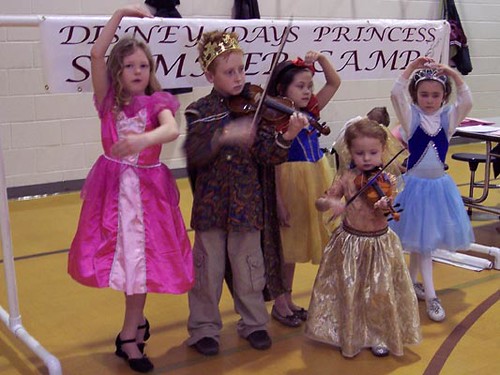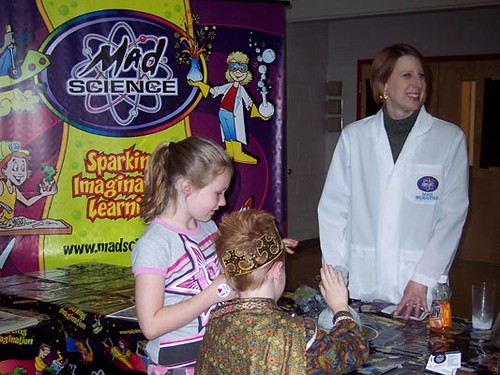
Learning science in kindergarten is a privilege that most public school students do not enjoy. Teachers have enough to do teaching them to read and do math and stand in line and answer to bells and wait their turn to speak and print their names properly and wait for paste and line up their crayons in a row. Ironically, the kids probably get more science education in preschool when they do themed unit weeks like weather week or ocean week than they do in the early elementary grades.
That's the kind of science little kids get, when they do get it: topical stuff. Let's learn about fish. Let's learn about plants. We'll learn about fish this week and plants next week, but we're not going to learn about what connects fish to plants or how the sun is connected to both fish and plants, because little kids don't typically get trusted with that kind of information. They aren't asked to see the big picture, draw lines between their thematic units, understand science as a whole, as a system of interconnected disciplines. A privileged first-grader who's getting a bigger-than-average helping of science is going to know the names of the planets and how bees make honey and that their eyes allow them to see, but that's where it stops. I can't honestly say that I've ever seen a whole-world approach to teaching science to young children until I saw Dr. Nebel's books.
His first book was a how-to manual addressing all aspects of elementary education, not just science. As an elementary level homeschool curriculum, it doesn't provide a box of workbooks, but teaches a philosophy of teaching and learning. It's called "Nebel's Elementary Education." Here's a summary, from the web site:
This single book (8 1/2 x 11, 450 pages) contains approaches and actual subject matter for delivering the entirety of a superior K-5 education. It describes not only WHAT to teach, but also HOW to teach it using hundreds of hands-on activities, and much more.
Most distinctive is the organization. Typical elementary curricula consist of an array of stand-alone units, which kids readily forget, confuse, and from which they never gain a full picture. In sharp contrast, Nebel lays out each subject (K-5) as a seamless continuum of lessons integrating different subjects along the way. Simultaneously, Nebel shows you how to guide your children along this pathway in a way that builds logically and systematically toward a broad, comprehensive, holistic understanding. The result is achievement of knowledge, skills, understanding, and problem-solving ability that will provide a solid foundation for all further learning.
The book is in total harmony with modern research concerning the most effective and efficient teaching techniques that bring children to become joyful, self-motivated learners. In short, this book may be considered a breakthrough in translating theory-what leads to the most effective and efficient learning-into a practical curriculum addressing all subjects.
His new book focuses just on science, and is called Building Foundations of Scientific Understanding: A Science Curriculum for K-2. I can't think of a reason why five-year-olds cannot begin to learn and understand science in context, just like they can start learning history at this age, not that they get that in public school either. Dr. Nebel has sponsored the G.U.E.S.S. Science Fair and we're proud to have him on board. We get to give away four copies of his books as prizes at the fair. If you appreciate Dr. Nebel's contribution and want to help spread the love, feel free to snag these images, link to his site, at http://www.pressforlearning.com, or drop him an email to say thanks. Homeschoolers have a special opportunity to start their children on the right path in science education, and Dr. Nebel can help.
That's the kind of science little kids get, when they do get it: topical stuff. Let's learn about fish. Let's learn about plants. We'll learn about fish this week and plants next week, but we're not going to learn about what connects fish to plants or how the sun is connected to both fish and plants, because little kids don't typically get trusted with that kind of information. They aren't asked to see the big picture, draw lines between their thematic units, understand science as a whole, as a system of interconnected disciplines. A privileged first-grader who's getting a bigger-than-average helping of science is going to know the names of the planets and how bees make honey and that their eyes allow them to see, but that's where it stops. I can't honestly say that I've ever seen a whole-world approach to teaching science to young children until I saw Dr. Nebel's books.
His first book was a how-to manual addressing all aspects of elementary education, not just science. As an elementary level homeschool curriculum, it doesn't provide a box of workbooks, but teaches a philosophy of teaching and learning. It's called "Nebel's Elementary Education." Here's a summary, from the web site:
This single book (8 1/2 x 11, 450 pages) contains approaches and actual subject matter for delivering the entirety of a superior K-5 education. It describes not only WHAT to teach, but also HOW to teach it using hundreds of hands-on activities, and much more.
Most distinctive is the organization. Typical elementary curricula consist of an array of stand-alone units, which kids readily forget, confuse, and from which they never gain a full picture. In sharp contrast, Nebel lays out each subject (K-5) as a seamless continuum of lessons integrating different subjects along the way. Simultaneously, Nebel shows you how to guide your children along this pathway in a way that builds logically and systematically toward a broad, comprehensive, holistic understanding. The result is achievement of knowledge, skills, understanding, and problem-solving ability that will provide a solid foundation for all further learning.
The book is in total harmony with modern research concerning the most effective and efficient teaching techniques that bring children to become joyful, self-motivated learners. In short, this book may be considered a breakthrough in translating theory-what leads to the most effective and efficient learning-into a practical curriculum addressing all subjects.

His new book focuses just on science, and is called Building Foundations of Scientific Understanding: A Science Curriculum for K-2. I can't think of a reason why five-year-olds cannot begin to learn and understand science in context, just like they can start learning history at this age, not that they get that in public school either. Dr. Nebel has sponsored the G.U.E.S.S. Science Fair and we're proud to have him on board. We get to give away four copies of his books as prizes at the fair. If you appreciate Dr. Nebel's contribution and want to help spread the love, feel free to snag these images, link to his site, at http://www.pressforlearning.com, or drop him an email to say thanks. Homeschoolers have a special opportunity to start their children on the right path in science education, and Dr. Nebel can help.






